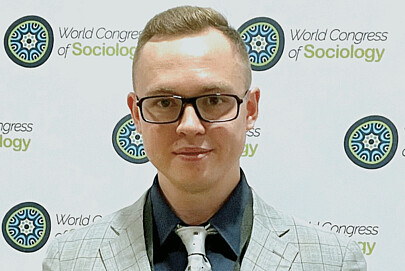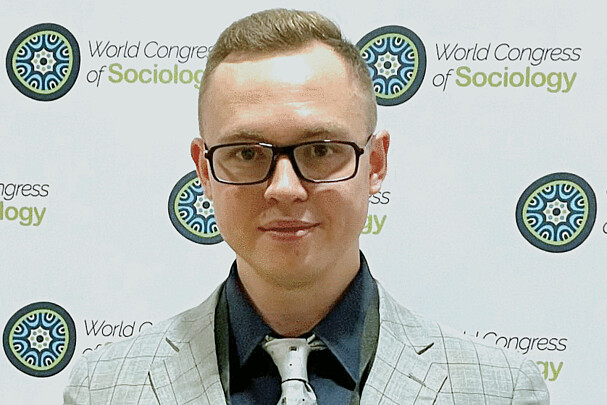Dr. Roman Smirnov


30159 Hannover


Forschungsgebiete
- Hochschulforschung und Wissenschaftssoziologie
- Russian Studies
- Russisch-Ukrainischer Krieg
- Qualitative Methoden
- komparative Soziologie
- Gesundheitssoziologie
Beruflicher Werdegang
Seit 03/2025 Wissenschaftlicher Mitarbeiter, Leibniz Universität Hannover
02/2023 bis 02/2025 Postdoktorand, Freie Universität Hannover
04/2022 bis 02/2023 Postdoktorand, Ben-Gurion-Universität des Negev (Israel)
02/2021 bis 04/2022 Forschungsprojektleiter, Forschungszentrum NAFI (Russland)
-
Publikationen
(a) Authored monographs
- Smirnov, R. (2020). Institutionelle Determinanten sozialer Mobilität: Vergleich sozialer Mobilität der DoktorandInnen in Österreich und Russland. PhD-Thesis. University of Graz, Austria.
(b) Chapters in refereed collective volumes and edited books
-
Smirnov, R. (2024). “About the Age Boundaries of the Online Generation of Modern Youth.” In: The Fields of Digital Research: theoretical, methodological and application challenges. Ed. Maiello, G., Masullo, G. McGraw-Hill Education.
-
Smirnov, R. (2017). “The 1917 Revolution: Generational Memory and Unconsciousness.” In: Russia in 1917: Institutional Resource, Social Risks and Civilizational Collapse. Ed. Orlov, M., Nauka.
(c) Refereed articles in peer-reviewed scientific journals
-
Smirnov, R. (2023). “Social Mobility of Graduate Students (Doctoral Students) in Russia and Austria: A Comparative Analysis.” Economics of Education. 5(138).
-
Smirnov, R. (2022). “Influence of the Parental Family on the Trajectories of Professional Mobility of Postgraduate Students.” Higher Education in Russia. 12.
-
Smirnov, R. (2021). “Indices of post-graduate students’ social mobility.” Sociological Research. 9.
-
Smirnov, R., Smirnova, T. (2020). “Institutional Elderly Care: Obstacles to Acceptance (the Case of Private Boarding Houses).” Sociological Research. 4.
-
Smirnov, R. (2020). “Attitude and evaluation by the Moscow city youth of the system of medical institutions (on the example of clinics).” Vestnik Universiteta. 5.
-
Smirnov, R. (2019). “Operationalization of the “Online Generation” phenomenon.” Digital Sociology. 4.
-
Smirnov, R. (2025). Forced meritocracy as a way of democratization: How to (re)build the higher education in Russia? In Scuola democratica: Education and/for social justice.
(d) Unrefereed professional articles and publications
-
Smirnov, R. (2025). “Inside the University Teaching Book of Russian Ideology.” Abstract Book of 16th ESA Conference “Tension, Trust and Transformation”. ISBN 978-2-9598317-0-6
-
Smirnov, R. (2024). “Forced Meritocracy as a Way of Democratization: How to (re)build the higher education in Russia?” In: SCUOLA DEMOCRATICA (Eds.). Book of Abstracts of the International Conference of the journal Scuola Democratica. Reinventing Education, Rome, Associazione “Per Scuola Democratica”
-
Smirnov, R. (2023). “Silence of the Labs: Adaptation Strategies of Russian Scholars during the Russian-Ukrainian War.” Abstract Book of the XX ISA World Congress of Sociology.
-
Smirnov, R. (2023). “Online Generation as a Social Group: To the Question of Age Boundaries.” Abstract Book IV International conference Lab for Innovative Social Research. Rethinking social theories and methods in a digital society. Prague, University of Finance and Administration. SCIENCEpress.
-
Smirnov, R. (2022). “Pandemic related changes of individual migrant strategies of international PhD students.” Abstract Book. Social Dynamics in the Post-COVID age. Inequalities, integration, migration in regional, urban, and rural context.
-
Smirnov, R. (2021). “Social Mobility of Young Scientists in the Pandemic- and Post-Pandemic-Era.” 15th Conference of European Sociological Association.
-
Vorträge
a) Chair of Session
2024 Congress of the Swiss Sociological Association (Basel, Switzerland)
“To trust, or not to trust, that is the question”. Vulnerability to information as a risk of modern society2023 Congress of Austrian Sociological Society (Vienna, Austria)
Der russisch-ukrainische Krieg und Europa: Risiken zu überdenken2021 15th Conference of European Sociological Association
Covid-19: Generational and Transnational Perspectivesb) Presentations
2024
Russian citizens since 24 February 2022: forming, expressing, and embodying stances on the war in Ukraine (Paris, France)
Topic: How easy it was to just... let go. How Russian scholars endure politicization and isolation2024 Congress of the Swiss Sociological Association (Basel, Switzerland)
Topic: Russian Authoritarianism, War and Vulnerability to Information on example of Russian Academics2024 16th Conference of European Sociological Association (Porto, Portugal)
Topic: Inside the University Teaching Book of Russian Ideology2024 International Conference of Scuola Democratica (Cagliari, Italy)
Topic: Forced Meritocracy as a Way of Democratization: How to (re)build the higher education in Russia?2023 XX ISA World Congress of Sociology (Melbourne, Australia)
Topic: Silence of the Labs: Adaptation Strategies of Russian Scholars during the Russian-Ukrainian War2023 Conference “Education as Commons. Democratic Values, Social Justice, and Inclusion in Education”, Association of Italian Sociology (Palermo, Italy)
Topic: Inclusion and Equality in Adult Education: Influence of the parental family on educational and professional trajectories of graduate student2022 Universities at the crossroads: academic freedom in a changing world, Center of Independent Social Research & Georgian American University
Topic: Free to be silent: strategies of communicational adaptation of Russian scholars2021 15th Conference of European Sociological Association
Topic: Social Mobility of Young Scientists in the Pandemic- and Post-Pandemic-Era2020 Society. Trust. Risks, State University of Management
Topic: Distant learning: Alternative and Challenge of Modern Higher Education -
Ausbildung
10/2020 Promotion in Sozial- und Wirtschaftswissenschaften, Universität Graz (Österreich)
2017 Masterabschluss in Soziologie, Staatliche Universität Saratow (Russland)
2015 Bachelorabschluss in Soziologie, Russiche Plechanow-Wirtschaftsuniversität (Russland)
